Choosing whole fruit over fruit juice gives you more nutrients, fiber, and health benefits. Whole fruits retain vitamins, minerals, and antioxidants better because they’re less processed, and the fiber helps control blood sugar and supports digestion. Juices often have added sugars and fewer nutrients due to processing. If you want to maximize health benefits, focusing on whole fruits is smarter—keep going to discover even more reasons why they’re the better choice.
Key Takeaways
- Whole fruits retain more vitamins, minerals, and antioxidants due to minimal processing and preservation of skin and fiber.
- They contain natural sugars balanced by fiber, leading to slower absorption and stable blood sugar levels.
- Whole fruits provide dietary fiber that supports digestion, gut health, and helps regulate bowel movements.
- They are lower in calories per serving and free from added preservatives or artificial additives.
- Juices are more convenient and portable but often have reduced nutrient content, higher calorie density, and lack fiber.
Nutrient Content and Density

While both whole fruits and fruit juices provide essential vitamins and minerals, whole fruits generally contain a higher concentration of nutrients per serving. When considering nutrient density, whole fruits shine because they retain all their fiber and skin, which boosts vitamin and mineral content. Seasonal availability influences the freshness and nutrient levels of fruits, as eating them when in season ensures maximum nutrients. Packaging options also matter; whole fruits often come in eco-friendly, minimally processed packaging that preserves nutrients better than processed juice containers. Juices, especially those stored for long periods or pasteurized, may lose some nutrients over time. Additionally, the presence of AI-driven monitoring in supply chains helps ensure that fresh, seasonal fruits reach consumers with optimal nutrient levels. Advances in food preservation technology further help maintain nutrient content during storage and transportation. It’s also worth noting that processing methods can significantly impact the nutrient profile of fruit juices, often reducing their vitamin content compared to fresh whole fruits. Ultimately, choosing whole fruits over juice ensures you get the most nutrients per serving, especially when fresh, seasonal options are available.
Sugar Levels and Natural Sweetness
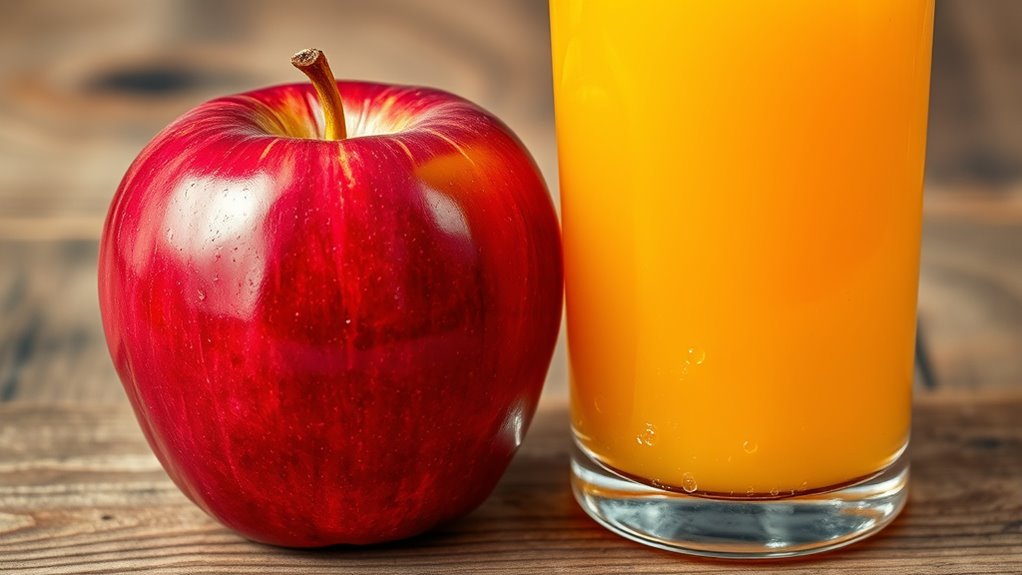
Whole fruits naturally contain sugars that give them their sweet taste, and these sugars are accompanied by fiber and other beneficial compounds. This natural sweetness is balanced by fiber, which slows sugar absorption, preventing spikes in blood sugar levels. In contrast, fruit juices often have added sugars, which boost sweetness without the fiber benefits. This difference impacts your health, as high added sugar intake can lead to weight gain and other issues. Understanding the sugar levels helps you make smarter choices. Additionally, efficient general ledger coding can support better financial decision-making related to health and wellness expenses. Incorporating knowledge about natural sugars can further enhance your dietary choices and overall well-being, especially since sugar content varies significantly between whole fruits and fruit juices. Recognizing the nutrient profile of each can help optimize your nutritional intake and health outcomes.
Fiber Content and Digestive Health
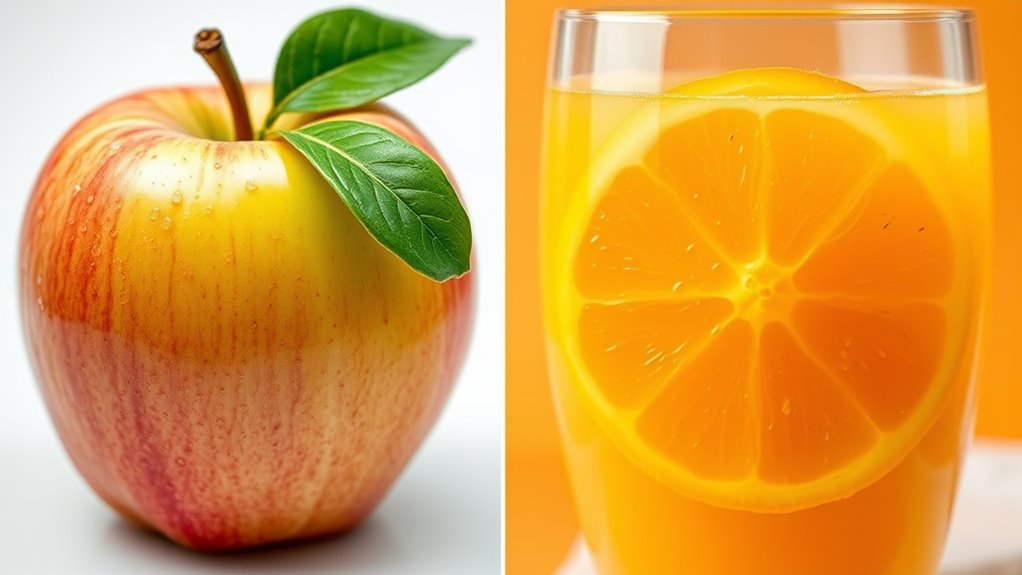
You get more fiber from whole fruits, which helps keep your digestion smooth. Fruit juice, on the other hand, lacks this important nutrient. Including whole fruits in your diet can support better gut health and regularity. Additionally, consuming whole fruits can provide a more satisfying snack, reducing the likelihood of overeating. Fiber content in whole fruits is a key factor in maintaining digestive health and preventing constipation. Digital literacy programs encourage playful communication and can help seniors navigate technology more confidently, potentially leading to increased consumption of healthy, fiber-rich foods through online resources. Filtration systems play a role in removing fine particles, but they don’t replace the benefits of fiber for digestion.
Whole Fruits Boost Fiber
Eating whole fruits substantially increases your fiber intake, which is crucial for healthy digestion. Compared to fruit juice, whole fruits offer a superior fiber comparison, providing both soluble and insoluble fiber that aid in digestion benefits. Soluble fiber helps slow digestion, stabilizing blood sugar levels, while insoluble fiber adds bulk to your stool, promoting regularity. This fiber content supports your gut health by encouraging the growth of beneficial bacteria and preventing constipation. When you choose whole fruits over juice, you’re not only consuming more fiber but also enhancing your overall digestive efficiency. Incorporating a variety of whole fruits into your diet ensures you get these necessary fibers regularly, contributing to better nutrient absorption and long-term digestive health. Additionally, fiber-rich foods can assist in maintaining a healthy weight and reducing the risk of chronic diseases. Consuming whole fruits is also a natural way to include additional nutrients like vitamins and antioxidants that are often lost during juicing.
Juice Lacks Dietary Fiber
While fruit juice may be a convenient and tasty option, it generally lacks the dietary fiber found in whole fruits. When juice is processed, fiber loss occurs because the juicing process removes most of the pulp and skin, which contain the fiber. This results in a product with fewer fiber benefits, affecting your digestion. Additionally, juice has texture differences compared to whole fruit, making it easier to consume quickly but less satisfying and less effective at promoting digestive health. Without fiber, your digestive system doesn’t get the stimulation it needs to function smoothly. As a result, drinking juice alone doesn’t support the same gut health as eating whole fruits, which retain their fiber content and texture. Moreover, the absence of fiber can contribute to gut health issues, emphasizing the importance of choosing whole fruits over juice. Incorporating a variety of fiber-rich foods can also support overall nutritional balance and digestive well-being. In fact, fiber’s role in maintaining a healthy gut is well-documented, highlighting the importance of fiber for optimal digestive function. Consuming whole fruits can also help prevent digestive discomfort caused by fiber deficiency.
Digestive System Benefits
Because fiber plays a crucial role in supporting your digestive health, consuming whole fruits offers significant benefits that juice cannot provide. The fiber in whole fruits promotes regularity and helps prevent constipation. It also influences fermentation effects in your gut, fostering beneficial bacteria growth. This interaction improves nutrient absorption and enhances overall digestion. Whole fruits contain insoluble and soluble fibers, which work together to regulate bowel movements. The fiber’s presence slows digestion, allowing your digestive enzymes to interact more effectively with nutrients. In contrast, juice lacks fiber, leading to rapid digestion and less favorable fermentation effects. Including whole fruits in your diet boosts fiber intake and supports a healthy, balanced digestive system.
| Fiber Type | Fermentation Effects | Digestive Enzyme Interactions |
|---|---|---|
| Insoluble Fiber | Promotes beneficial fermentation | Slows enzyme access for digestion |
| Soluble Fiber | Enhances fermentation, prebiotic effects | Improves enzyme efficiency |
| Whole Fruit | Supports overall digestion | Facilitates enzyme-nutrient contact |
Calorie Count and Portion Control
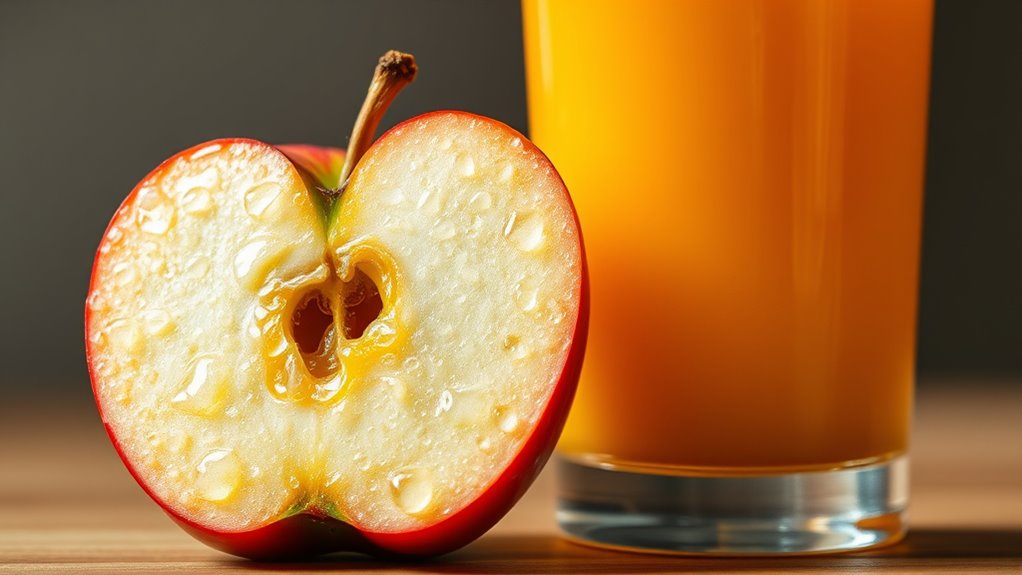
When comparing whole fruit and fruit juice, paying attention to calorie count and portion size is essential. Whole fruits typically have lower calorie density because they contain fiber that helps you feel full with less calorie intake. Juice, on the other hand, often comes in larger portions and is more calorie-dense, making it easy to consume extra calories quickly. To better understand, consider:
Whole fruits are less calorie-dense and more filling than juice, which can lead to overconsumption of calories quickly.
- A single cup of fresh fruit might contain around 80 calories, while the same volume of juice can pack 120 calories or more.
- Whole fruits usually require more chewing and take longer to eat, naturally controlling portion size.
- Juice servings are often smaller but concentrated, leading to higher calorie intake in a shorter time.
- Incorporating portion control into your presentation can encourage mindful consumption and make healthy choices more appealing.
- Remember that the presence of fiber in whole fruits plays a crucial role in managing calorie intake and supporting digestion.
Being mindful of portion size helps you avoid overconsumption and manage your calorie intake effectively.
Impact on Blood Sugar Levels

When you eat whole fruits, your blood sugar levels tend to rise more slowly than with fruit juice. Juice often causes quick spikes because it has a higher glycemic index and lacks fiber. Understanding these differences can help you manage your blood sugar more effectively.
Blood Sugar Spikes
Consuming fruit juice can cause rapid spikes in blood sugar levels, often more than eating whole fruit. The liquid form allows sugars to enter your bloodstream quickly, overwhelming your body’s ability to regulate blood sugar. This sudden increase affects your sweetness perception, making you crave more sweet foods. Additionally, manufacturers often preserve flavor through added sugars, amplifying the spike. When you drink juice, the absence of fiber means there’s less to slow down sugar absorption. As a result, your blood sugar rises sharply, then drops quickly, leaving you feeling tired or hungry sooner. This pattern can undermine your energy stability and increase your risk of insulin resistance over time. To avoid these spikes, opt for whole fruits that contain fiber and natural sugars, promoting steadier blood sugar levels.
Glycemic Index Differences
The glycemic index (GI) measures how quickly a food raises blood sugar levels after eating. Whole fruits typically have lower GIs compared to fruit juices because fiber slows digestion, reducing glycemic index variability. This means your blood sugar rises more gradually with whole fruits, leading to a steadier insulin response. In contrast, fruit juices often have higher GIs due to the removal of fiber, causing rapid glucose absorption and sharper blood sugar spikes. The insulin response is more pronounced with juices, which can challenge your body’s ability to regulate blood sugar levels efficiently. Choosing whole fruits over fruit juice minimizes these fluctuations, promoting better blood sugar control and reducing the risk of insulin resistance over time.
Vitamin and Mineral Retention
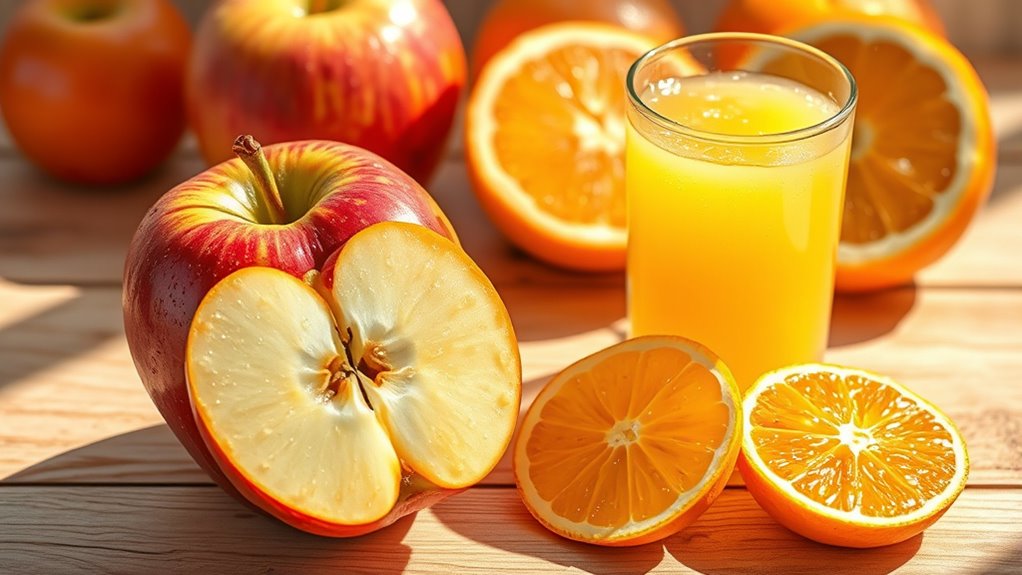
Vitamin and mineral retention often differs considerably between whole fruits and fruit juices. When you choose whole fruits, you retain most nutrients because minimal processing occurs, preserving antioxidant preservation and enzymatic activity. Juicing, however, often involves exposure to heat and oxygen, which can degrade sensitive vitamins and minerals. This process can lead to a significant loss of nutrients, especially those that are unstable or easily oxidized.
- Whole fruits keep antioxidants intact, boosting your immune health.
- Enzymatic activity in whole fruits aids digestion and nutrient absorption.
- Juicing may strip away some vitamins and minerals, reducing overall nutrient density.
Understanding these differences helps you make smarter choices, ensuring you get the maximum benefit from the nutrients in your fruit.
Presence of Additives and Preservatives

While whole fruits typically come without added chemicals, fruit juices often contain preservatives and artificial additives to prolong shelf life and improve taste. These preservatives can impact health by introducing chemicals that may cause allergic reactions or other adverse effects over time. Artificial additives, such as coloring agents or flavor enhancers, are common in many commercial juices to make them more appealing, but they don’t contribute any nutritional value. The presence of preservatives and artificial additives in fruit juice can lead to concerns about long-term health effects, especially with frequent consumption. In contrast, whole fruits usually don’t contain these substances, making them a cleaner, more natural choice. Being aware of these differences helps you make better decisions about what to include in your diet.
Convenience and Storage Considerations
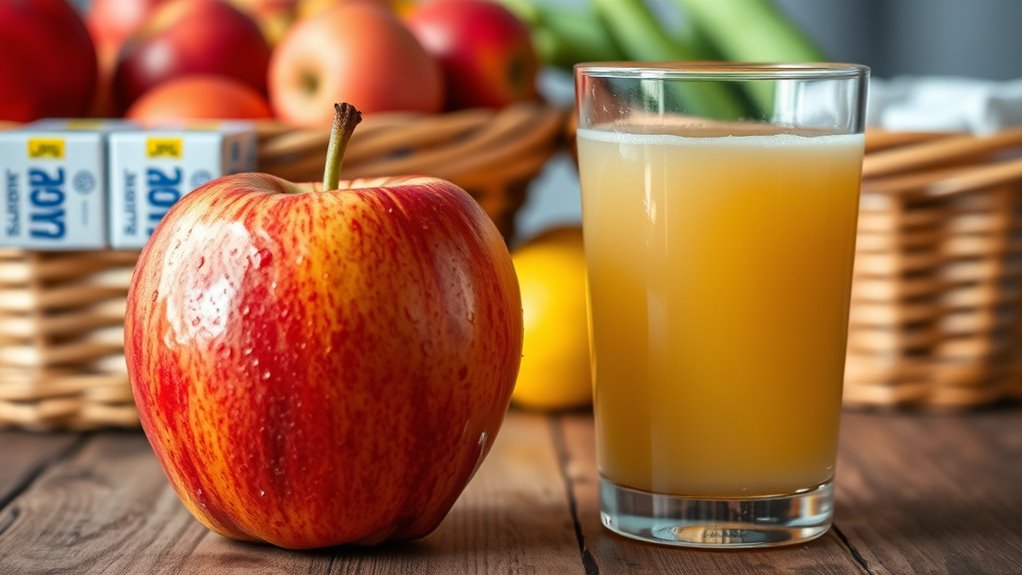
Convenience and storage are key factors when choosing between whole fruits and fruit juice. Whole fruits typically require more storage space and careful handling, but they offer better storage ease and longer shelf life if stored properly. Fruit juice, on the other hand, is highly portable, easy to grab on the go, and doesn’t need refrigeration before opening.
Whole fruits require more storage but offer longer freshness; juice is portable and easy to carry.
- Whole fruits can be stored in your pantry or fridge, but they may take up more space.
- Juice bottles are compact, making them perfect for travel or work lunches.
- Juice often comes in sealed, lightweight containers, simplifying storage and transportation.
Consider how you prioritize portability and storage ease in your routine, as these factors can influence your choice for convenience.
Overall Health Benefits and Risks
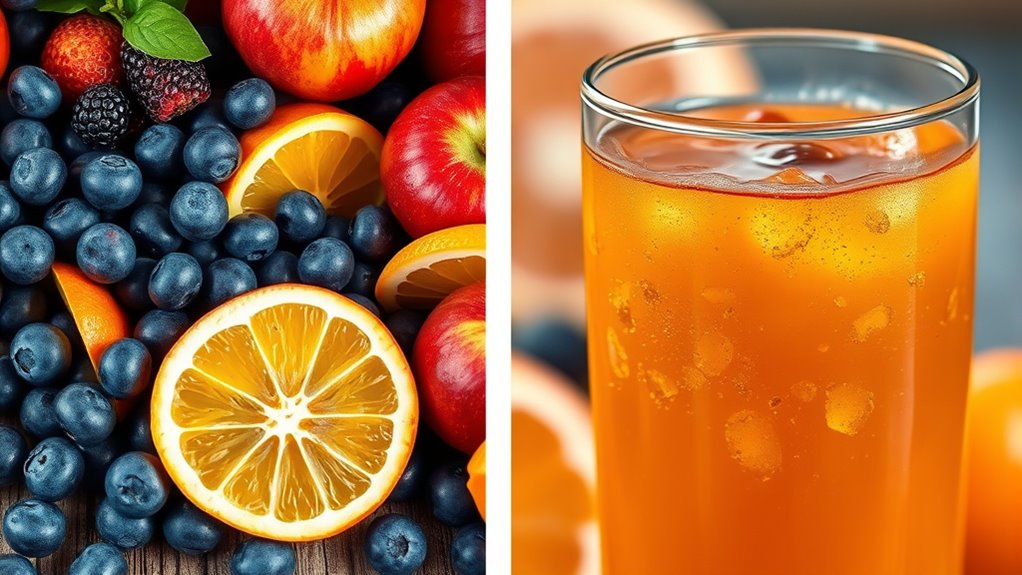
Choosing between whole fruit and fruit juice can substantially impact your health, as each offers different benefits and potential risks. Whole fruits retain more fiber, helping with digestion and blood sugar regulation, and they preserve antioxidants better, supporting immune health. Fruit juice, however, is often more concentrated and easier to consume, giving you quick energy and nutrients. But be cautious: juice can cause sugar spikes and may have allergen risks if processed in facilities handling common allergens. Additionally, antioxidant preservation in whole fruits is generally higher because antioxidants degrade less during minimal processing. Overall, whole fruits tend to be healthier long-term, but if you opt for juice, choose freshly squeezed or minimally processed options to maximize benefits and minimize risks.
Frequently Asked Questions
How Does Processing Affect the Nutrient Quality of Fruit Juice?
Processing affects the nutrient quality of fruit juice by reducing some vitamins and antioxidants during pasteurization, which kills bacteria but can degrade heat-sensitive nutrients. You might also encounter pesticide residues if not thoroughly washed or processed properly. While pasteurization helps ensure safety, it can diminish certain nutrients, so choosing minimally processed or organic juices can help retain more of the fruit’s natural nutrients.
Are Organic Fruit Juices Healthier Than Conventional Options?
Oh, absolutely, organic fruit juices are the superheroes of the beverage world—except maybe they’re not. With organic certification, you might think you’re dodging pesticides, but some residue still sneaks through. While they’re generally better for avoiding synthetic pesticides, they aren’t magic. You’re better off eating whole fruits for maximum nutrients, but if you love juice, go organic—just don’t expect it to transform your health overnight.
Can Drinking Fruit Juice Help With Hydration Better Than Whole Fruit?
Drinking fruit juice can boost hydration efficiency, especially if it contains added electrolytes, helping replenish minerals lost through sweat. However, it may not hydrate as effectively as eating whole fruit, which provides fiber and a slower absorption rate. If you’re looking for quick hydration, juice with electrolytes can be beneficial, but for sustained hydration and overall health, whole fruit is the smarter choice.
What Are the Environmental Impacts of Fruit Juice Production Versus Whole Fruit Consumption?
You might wonder about the environmental impacts of fruit juice production compared to eating whole fruit. Producing juice often requires more water, energy, and packaging, increasing its carbon footprint. Sustainable farming practices can reduce these effects, but overall, whole fruit consumption tends to be more eco-friendly. By choosing whole fruits, you support lower resource use and help minimize environmental harm linked to large-scale juice manufacturing.
How Does Storage Duration Influence Nutrient Retention in Both Whole Fruit and Juice?
It’s funny how you might forget that storage duration really impacts nutrient retention. When you store both whole fruit and juice, their storage stability varies—juice tends to degrade nutrients faster, especially vitamin C, due to exposure to light and air. Whole fruits, with their protective skin, usually maintain nutrient quality longer, but over time, nutrient degradation can still occur, making fresh consumption the best for maximizing health benefits.
Conclusion
Choosing whole fruit over juice is like holding a vibrant orchard in your hand, filled with textures and natural sweetness. You savor the crisp crunch and feel the nourishing fiber fueling your digestion. Juice may be quick and convenient, but it often leaves behind the true essence of fruit. For lasting health, embrace the colorful bounty of whole fruits—your body will thank you with energy, balance, and a taste of nature’s purest delight.









